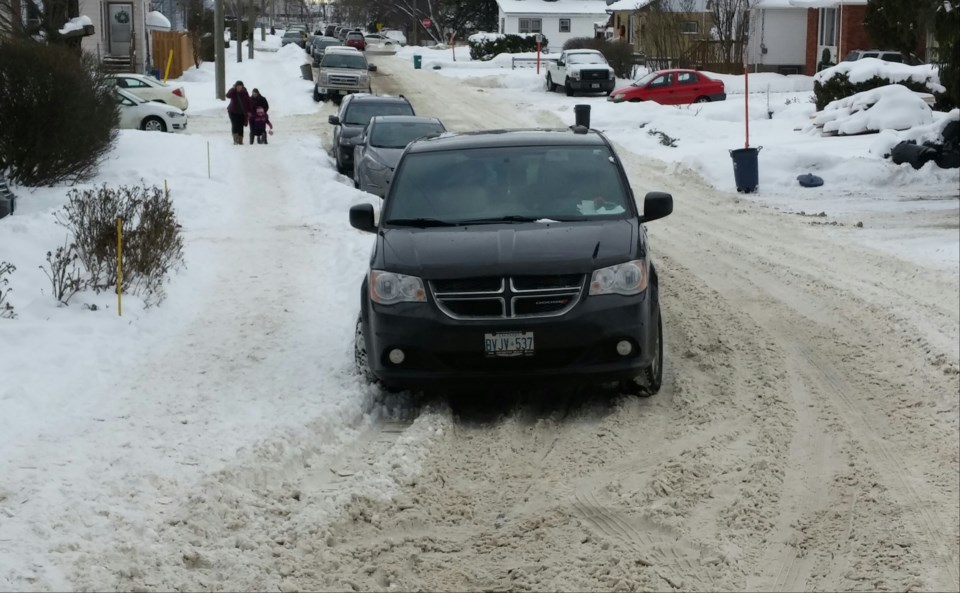Come November 1, three parking prohibitions beginning at 3 a.m. will end at three varying times after Council voted in favour of new overnight parking measures Tuesday.
Parking in the Downtown Improvement Area (DIA) will be allowed after 6:30 a.m. The prohibition will lift at 8:30 a.m. on cul-de-sacs and dead end roads. All other streets in North Bay will be subject to a 7:30 a.m. time when on-street parking will be permitted.
The parking prohibition will also now end on April 15, as opposed to the recent March 31 finish date. Coun. Tanya Vrebosch made it clear that social media and other avenues would be used to inform residents that vehicles should not be parked on city streets if snow falls again after the initial melt (as it has for the last several years). Tickets are generally not given out after the melt in the spring, said Vrebosch, nor before the first snowfall in late autumn.
The sometimes contentious amendment to the now former 3 a.m. to 6 a.m. overnight parking ban did not add up for four councillors (Mike Anthony, Mark King, Daryl Vaillancourt and George Maroosis) and public presenter Monique Peters, who suggested that if the addition of a second dog park warranted public consultation, so should the overnight parking debate.
The original proposal that was brought forward in late 2016 was sent back to two different committees and then separated from another group of parking housekeeping matters that eventually passed.
"I'm hoping we can come to a decision tonight, I will not be referring it back to committee," announced Vrebosch. "Trying to find a consensus was not easy on this, some councillors wanted to change a half hour here, a half hour there."
Vrebosch noted that the changes were viewed by city staff as ways to make snowplowing more efficient while reducing costs. Since cul-de-sacs and dead end roads are cleared after arterial roads, plows cannot get to these roads during the current prohibition parameters. The former 6 a.m. lifting of the ban allowed vehicles to congest those areas, forcing crews to return, in some cases multiple times, throughout the day to finish plowing.
"The 3 a.m. starting time is not being changed as public works crews primarily start at 4 a.m. during winter shifts when snow clearing is required. If they are to start early, which is sometimes required as per minimum maintenance standards, then there is an increase in overtime as per the collective agreement. Any time saved by these changes will be used to remove snowbanks around accessible parking and other temporary snow storage locations around the city," said Vrebosch before the floor was opened to her colleagues.
Vaillancourt voiced his opposition, saying that, "It is my understanding that we have the ability to change a shift with the proper notices. We can change the shift one way, we can change it back to another way[...]Fundamentally, the services we offer for the citizens of North Bay are for the citizens, not the other way around. For instance, [not being able to park on] a cul-de-sac at 8:30 in the morning is extremely inconvenient."
Anthony concurred with Vaillancourt's sentiments, saying the notion of "being more concerned with having people out when the snow is there, when we know it's coming, as opposed to being bound by a schedule," would better serve residents.
Deputy Mayor Sheldon Forgette gave his support to the motion and again brought up the idea that the City examine the method used in Ottawa to warn owners of vehicles electronically that they will not be permitted to park on streets on a given night.
King weighed in, saying that "to suggest that somehow between 4 a.m. and 7:30 in the morning that we could physically do a good job of cleaning the snow inside the city is just not possible. I think we've seen the results of that type of snow removal. As chair of community services, I've been deeply concerned in the winter months with respect to the transit drivers attempting to get around the city with the height of snow banks and the general conditions of roads.
"We need to start over with the snow removal process. We should be calling crews out at midnight, we should be having them complete their plowing at about 6:30 in the morning. Unless it's an emergency those plows should not be on the roads after 7 in the morning."
King then cited an email from Daniel Johnston, the operating manager of the Nipissing-Parry Sound Student Transportation Service, that has over 6,000 students in their care. In the correspondence, Johnston claims that his organization was not consulted when these amendments were being considered. King stressed that he felt such a consultation should occur before the matter went to a vote.
Vrebosch, who had stated that she desired a resolution one way or the other, had a rebuttal for each of the concerns raised, and ultimately, had the last word on the matter, "We have a CUPE agreement right now that other communities want. That 4 a.m. clause, other communities want, it saves us money. You go and open that up and start saying that you want people coming in at midnight, and get rid of that 4 a.m. clause, it will cost us money. Staff has told us that time and time again."



